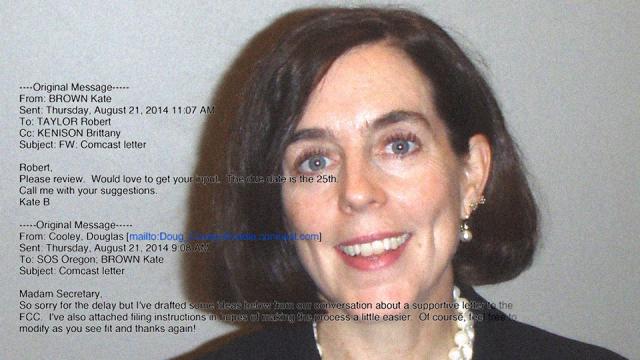
John Kitzhaber’s resignation last Friday as governor of Oregon presented officials with a complicated situation regarding the transparency of selecting his replacement. The four-time democratic governor conceded his position after months of intense pressure from senate democrats following an ethics probe of his fiancé, Cylvia Hayes. Now, Oregon on Wednesday replaces Kitzhaber with current democratic Secretary of State Kate Brown – someone whose shady ties to Comcast may put her as much in conflict with public interest as the ousted governor.
The Hayes/Kitzhaber scandal isn't pretty. State officials were investigated in 2010 for misappropriation of government contracts given to Hayes, charges that were later dropped. But last year it was revealed that Hayes entered into a “green card marriage” for money back in 1997, in addition to being implicated in a marijuana growing operation in Washington during that same year.
More damaging for Kitzhaber, however, were the conflicts of interest surrounding Hayes's work. The U.S. Department of Justice claimed Hayes acted as a policy adviser to Kitzhaber and had authority over state employees. Nepotism and patronage are nothing new in government. But Hayes’s unpaid consultancy for Kitzhaber combined with her soon-to-be "first lady" title – using a public position for private gain – presented a breach of ethics that went too far. While Hayes wasn't paid directly for her work in the governor's office, the Oregon Government Ethics Commission claims she used her relationship and position to promote her consulting business; Hayes has been accused of accepting more than $200,000 in private contracts while she "appeared to wield significant authority over government employees."
More Corruption on the Way?
Now, enter part two with the incoming governor and her Comcast connections. Last August, Secretary of State Kate Brown – who is being sworn in today to replace Kitzhaber – was given a letter drafted by Comcast lobbyist Doug Cooley. The timing of the letter was crucial, since the company was about to enter into merger negotiations with Time Warner Cable. The merger would decrease competition, allowing the company's already high prices to rise even higher for customers. In a 2014 Consumer Reports poll, Comcast and Time Warner were ranked as two of the three most loathed cable providers in America.
Consumer activists groups strongly opposed the merger. But Brown signed the letter, after making a few adjustments to the draft so as to not overtly indicate her support of the company’s takeover bid. Instead, Brown chose to detail Comcast’s charitable intentions of bringing broadband access to low-income families. But Brown’s spokesperson Tony Green has admitted that Brown didn't possess any specific knowledge about how the merger would affect customers, let alone issues surrounding net neutrality.
Comcast reportedly donated nearly $10,000 to Brown’s campaigns for secretary of state, and as evidenced by the letter, she appeared to be returning the favor. With the company's $45 billion takeover bid hanging in the balance, Brown hasn’t amended her statements. In fact, Brown's ascension to the governor's seat may only fuel Comcast's chance of a merger success. Brown is already known in many quarters as a “Comcast Puppet.”
For this reason, transparency under the next Oregonian governor will be key. This could include Brown explaining her decision and, more specifically, revealing her motivation for supporting the Comcast merger. For now, however, Brown remains silent on the issue, and her spokesperson has rejected discussing it at her request. As Governor, Brown will have a chance to support legislation that blocks the Comcast merger, or at least renegotiates the deal to protect the public from such a staggering monopoly.
Until then, a question may linger: did Oregon just exchange one corrupt governor for another?
3 WAYS TO SHOW YOUR SUPPORT
- Log in to post comments
















